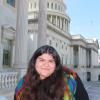I got into the taxi, curbside at Barajas International, and cheerfully greeted the driver. “¡Buenos días! Calle Hilarión Eslava, por favor.” Despite the time change and having barely slept, I was alert and talkative during the ride, watching the rows of red brick apartments fly past the cab window. My driver was telling me about my new neighborhood, saying it was lively, full of young people and restaurants. I wondered about the name of the street I’d be staying on. I knew eslava meant slave but I couldn’t recall ever learning the other word.
I forgot all about that upon arriving at my homestay, where I received a warm welcome and a small mountain range of spaghetti from the señora I’d be living with. She directed me down a pink hall, through a pink dining room, and into a baby blue bedroom where I dropped my bags. My window looked out into the building’s interior courtyard where lines of dark sweatshirts and bed sheets dried in the crisp January air. I opened the window and imagined the weather getting warmer and the clotheslines more colorfully decorated until they resembled the bright pastel walls of my apartment, lighting up the courtyard like blooming pelargoniums in a hanging garden. I imagined becoming accustomed to this cotton candy house and its red tile courtyard and thought that even if I stayed up through ten international flights I would never get tired here.
15 hours later it’s 3:00am and I’m just about ready to go home. My ears are ringing with the club’s reggaeton and Daddy Yankee is inside my head repeating “shaky shaky shaky shaky shaky shaky shaky” over and over. It’s now been almost two weeks since I arrived but that song is still stuck in my head because I hear it every time I leave my house. While walking home on Friday night, my roommate joked that all Spanish music sounded the same, citing the singular drum pattern in every song we’ve hard at a bar so far. I laughed and agreed as we turned onto our street and I remembered I had never found out what its name meant.
It turns out Miguel Hilarión Eslava was a Spanish composer and music teacher born in 1808. He vigorously defended Spanish opera throughout his life, insisting on the value of profound, candid sentiment in music, whether it adhered to formal rules or not. I listened to one of his compositions, “Tu es Petrus,” and, rest assured, it sounded nothing like Daddy Yankee. The regular routine of waking up, going to class, skating, studying, and going to bed has already begun to feel repetitive, but each time I look at my street sign I’m reminded that I’ve barely scratched the surface of Spanish culture. In the coming months I hope to dig deeper and remind myself that no aspects of life here, music included, are monolithic.

Max Harrison-Caldwell
I’m a Spanish major in my third year at Occidental College. I want to pursue a career in journalism after graduating so right now I’m trying to get as much writing experience as I can. In addition to writing, I like skateboarding and pita chips.







